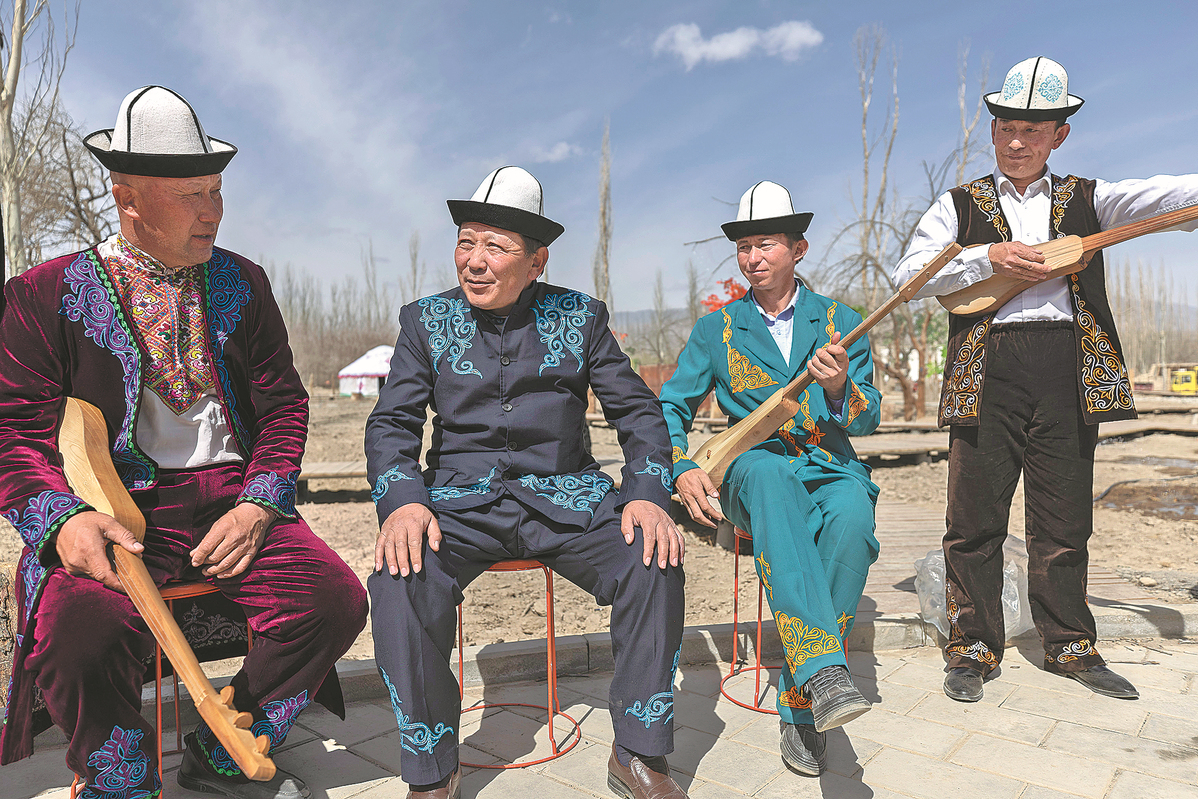Manas epic grows in stature


Master performer
In 1957, Hu opened a Kirgiz language class at the Central Institute for Nationalities. Three years later, he led students to Xinjiang for internships, extensively documenting and translating the Manas and publishing it in newspapers and magazines.
In 1961, the Central Institute of Nationalities, Xinjiang Federation of Literature, Xinjiang Literature Research Institute, and Kizilsu Kirgiz autonomous prefecture government jointly established a working group on Manas, headed by Hu. During one of the group's trips to Xinjiang, Hu met folk singer Gusev Mamay.
Gusev, the master of singing Manas, was born in 1918 in Kezilesu Kirgiz autonomous prefecture. He was later invited to Beijing to record his Manas performance. He was received by then Chinese leaders and praised as a "national treasure".
Gusev sang without inhibition. In one year, he recorded all the eight chapters of Manas, a total of more than 230,000 lines.
Hu said of the epic: "Apart from the main plot being unchanged, Manas will be performed differently by each singer. Even if the same singer sings the same passage, it may be different today and tomorrow. Talented singers will add their own improvisations."
Gusev's improvisations were beautiful, and the singer was able to enrich the poetic style according to his cultural knowledge, Hu said.
Hu also introduced Gusev to the world when attending international conferences. In 1995, Gusev was awarded the Order of Manas, the highest cultural medal in Kyrgyzstan, and was acclaimed as the "living Homer" by epic experts at home and abroad. Gusev passed away in 2014 at age 96.
As Hu's research on Manas went deeper, he realized that it was not only a precious literary heritage but also an encyclopedia of knowledge on the Kirgiz people.
As a cultural treasure for thousands of years, Manas has become a bridge for cultural exchanges and mutual learning between China and Central Asian countries.
The government of Kezilesu Kirgiz autonomous prefecture has held nine Manas International Cultural Tourism Festivals since 2007 and sponsored regular concerts, competitions, forums. It staged a song-and-dance drama titled Manas in Beijing in March.
Wider audience
Yang Qingxiang, deputy dean of the School of Liberal Arts at Renmin University of China, said performances of Manas outside Xinjiang help promote the epic. "A classic, excellent literary work needs a large audience to prosper," he said.
"Manas has a strong story, and the promotion of literary works can help it become more widely known, like epic legends such as Ashima of the Yi ethnic group and King Gesar of the Tibetans."
Manas has been translated into many languages. In April 2022, a full translation of the epic into Mandarin was finally published by Xinjiang People's Publishing House.
Since 2004, the government of Kizilsu prefecture and the Literary Federation of Xinjiang Uygur Autonomous Region jointly initiated the translation of Manas into Chinese, based on the republication of the Kirgiz version of Manas sung by Jusuf Mamayi.
The Translation Working Committee has organized more than 40 experts to unify the translation terms, formulate translation rules and work procedures.
"The Chinese-language version of the Manas book is another important achievement of the historic leap from oral transmission to written communication," said He Jihong, a cultural expert.
He, 78, became a cultural adviser to the local government after retiring from the Historical Records Office in Kizilsu Kirgiz autonomous prefecture in 2005. He has devoted himself to the translation of Manas into Chinese for more than a decade. "The process of translation is full of difficulties, from searching information to organizing singers and translators, but finally, we make it," he said.
He added, "Next, with the support of the government, we plan to edit eight books of Manas and publish them as pamphlets to solve the problem of the high price of the whole book, and also reduce the content of the edited book so that readers can find it easier to read, further enhancing the influence of Manas."
Recently, a variety of pictures appeared in Urumqi subway cars, which delighted commuters with their "Xinjiang flavor".
According to Hu, the influence and importance of Manas has no end. "It will continue to be written and sung by the Kirgiz people as history evolves, continue to record every aspect of the social life of this nation, and incorporate the fresh vitality, rich emotions, and wisdom of the Kirgiz people for generations," he said.
As Gusev sang prophetically in the preface of Manas:
"From then on,
How much the earth has changed:
The Gobi was left with stones,
The rocky beach turned into a forest again,
The green fields turned into rivers,
The rocks of the mountain stream have moved,
Everything has changed so much,
Only the epic of our ancestors,
Is still passed down from generation to generation."
























